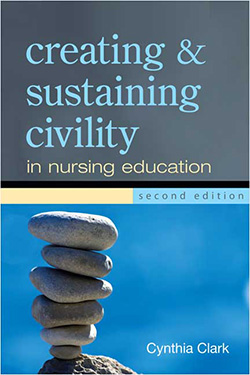Healthy coping strategies make a big difference!
 In the author’s national survey of 5,000 nursing students, respondents revealed that average overall stress can drop by nearly a third by adopting healthy coping strategies
In the author’s national survey of 5,000 nursing students, respondents revealed that average overall stress can drop by nearly a third by adopting healthy coping strategies.
A new semester is upon us, and nurse educators have welcomed students back to campus. Returning to university life often brings a heightened level of stress for teachers and learners alike. Pursuing a nursing degree is stressful. Mastering challenging course material, performing well on exams, and acquiring complex clinical skills can exact an emotional toll. Balancing school, work, family, and other life responsibilities creates additional pressures.
 The American College Health Association’s National College Health Assessment, published in the fall of 2017, reveals that the top five stressors for college students are dealing with stress, anxiety, sleep difficulties, depression, and illnesses such as colds, flu, and sore throats. The percentage of college students diagnosed with depression increased from 10 percent in 2000 to 17.8 percent in 2017. Nearly half (45.1 percent) reported above-average levels of stress, 12.5 percent reported tremendous levels of stress, and 20.0 percent reported feeling hopeless. I’d be surprised if those numbers aren’t higher for nursing students.
The American College Health Association’s National College Health Assessment, published in the fall of 2017, reveals that the top five stressors for college students are dealing with stress, anxiety, sleep difficulties, depression, and illnesses such as colds, flu, and sore throats. The percentage of college students diagnosed with depression increased from 10 percent in 2000 to 17.8 percent in 2017. Nearly half (45.1 percent) reported above-average levels of stress, 12.5 percent reported tremendous levels of stress, and 20.0 percent reported feeling hopeless. I’d be surprised if those numbers aren’t higher for nursing students.
I conducted a national survey of more than 5,000 nursing students (Clark, 2014) to learn about stress they experienced during their nursing programs—their top stressors and most effective coping strategies. I also asked them to indicate how healthy coping activities affected their stress. On a scale of 0 to 100, the survey revealed an average overall stress level of 75.2.
 Top stressors included dealing with challenging coursework, pressure to succeed, and fear of failure (including worry about harming patients). The students’ most effective coping strategies included talking and spending time with friends and family, physical activities, prioritizing responsibilities, and other self-care. One of the study’s most impressive findings was that students, on average, rated their overall stress level as 49.7 percent after engaging in healthy coping activities. That’s an amazing drop of more than 25 percentage points, which indicates the positive impact of employing healthy coping strategies to reduce stress.
Top stressors included dealing with challenging coursework, pressure to succeed, and fear of failure (including worry about harming patients). The students’ most effective coping strategies included talking and spending time with friends and family, physical activities, prioritizing responsibilities, and other self-care. One of the study’s most impressive findings was that students, on average, rated their overall stress level as 49.7 percent after engaging in healthy coping activities. That’s an amazing drop of more than 25 percentage points, which indicates the positive impact of employing healthy coping strategies to reduce stress.
Stories of stress
To further understand nursing students’ perceptions of stress and coping, I asked approximately 100 senior-level nursing students to describe the most stressful experience—or one of the most stressful—they encountered during their nursing program, how it affected them, and how they coped with the situation. Two of their stories are provided below as exemplars.
Super-stressed and feeling totally inadequate
During one of my clinical experiences, I was assigned to a patient with a severe spinal-cord injury. I will call him Mr. Green. My clinical preceptor was only marginally involved and often took a hands-off approach. While I was assisting a patient in another room, I heard Mr. Green call out loudly for help. I let the patient whom I was assessing know that I would be back in a moment and rushed into Mr. Green’s room.
He was flustered and very distressed because he was unable to urinate. I rushed to the bathroom to get the urinal, but it wasn’t there. I quickly looked through the drawers and found it. By the time I got to him, he had started urinating. I tried my best to assist him, but it was clear I was too late. In my rush, I had forgotten to use gloves.
I did my best to help him, but he was clearly embarrassed, and, I must admit, I was embarrassed, too. I dealt with the situation, but I left feeling totally inadequate. I was super stressed out and wondered what I could have done differently. I think about Mr. Green a lot—the situation really affected me. I really haven’t coped well. I wonder if I will ever be a good nurse.
In a constant state of stress
I was in a constant state of stress throughout my nursing program. The combination of attending classes, going to clinical, having multiple exams every couple weeks, and dealing with family issues—the stress became too much. I neglected myself and used extremely unhealthy coping strategies. Basically, I didn’t cope at all, and, while I still got reasonably good grades, my personal life and overall health truly suffered.
I knew if I was going to survive nursing school, I had to change something, so I began making myself a priority as best I could. I realized I couldn’t do it alone, so I ended up seeing a counselor for test anxiety and anxiety in general. I started taking antidepressants. I found that my family and friends could be a strong support during stressful times, but I hesitated to lean on them too much. Mostly, I dealt with it alone.
Three primary categories
After collecting the students’ stories, I organized them into three main categories: 1) top stressors, 2) impact of stressful experiences, and 3) coping strategies.
Top stressors
Students reported top stressors as: 1) intense workloads related to attending classes and clinical experiences; 2) taking exams; 3) preparing for NCLEX; 4) completing assignments; 5) juggling work, school, family, and other life responsibilities; and 6) dealing with personal problems. Other major stressors included being the target of incivility from faculty members, clinical preceptors, staff nurses, and physicians; organizational volatility within the nursing program; and dealing with challenging patient experiences and conditions.
Impact of stressful experiences
Stressful events had a significant impact on students. They described feeling overwhelmed, fearful, anxious, helpless, and incompetent. Some said they felt threatened, intimidated, angry, and frustrated, and others shared that stressful experiences left them feeling marginalized, detached, and withdrawn.
Some students commented that stressful encounters interfered with their ability to think critically, self-reflect, and provide quality care. These experiences also had a negative impact on students’ physical health, e.g., migraine headaches, gastrointestinal disturbance, racing heart rate, respiratory problems, and high blood pressure. In some cases, students contemplated dropping out of nursing school because their stress levels were so intense.
Coping strategies
Many students reported living in a perpetual state of stress in which coping strategies were often ineffective, providing either minimal or no stress relief. For those who used coping strategies to alleviate stress, some strategies were healthy and others unhealthy. Healthy strategies included seeking support from family, friends, faculty, and classmates; talking with a counselor; exercising and engaging in physical activity; relying on prayer and meditation; and setting short- and long-term goals. Unhealthy strategies included using and abusing drugs and alcohol, relying on prescription drugs, and overeating.
Faculty support and role modeling
When heightened stress is poorly managed, learning is compromised. For nurses, excessive stress coupled with ineffective coping can negatively impact patient care. So what can nurse educators do to help students reduce their stress levels and cope in healthy ways?
One way to help students deal with stress is by being available, approachable, and inclusive, because frequency and quality of contact with students, both inside and outside the classroom, help establish positive relationships with students. Showing genuine interest in student success improves their motivation, learning, retention, and academic achievement. They are less stressed and cope more effectively if they feel supported by faculty and are shown reasonable flexibility relative to coursework. Providing prompt and quality feedback also helps reduce student stress. Students want to know how they’re doing in class and clinically and how to improve their performance (Clark, Nguyen, & Barbosa-Leiker, 2014).
Urging students to engage in stress-reducing activities and self-care techniques can be extremely helpful. When I was working as a professor, I invited Marty Downey, a colleague and certified holistic health nurse, to join me in class to help nursing students practice “in the moment” stress relievers. Using humor, resilience training, and mindfulness, we collaborated to help students focus on self-care and professional well-being. Nurse educators who model healthy behaviors such as eating well, exercising, and taking care of themselves encourage students to do the same.
Engaging in physical exercise and other stress-reducing activities—such as yoga, meditation, listening to music, or enjoying time with family, friends, and pets—can help ease tension and anxiety. It’s also important to encourage students to manage their time by organizing and prioritizing their activities and assignments—from high priority to low priority. Eliminating low-priority tasks altogether or rescheduling them for completion in the future can be very effective in reducing stress. Unplugging from devices, scheduling time to meet with a friend or loved one, or just taking time to breathe and disconnect can help students de-stress.
Listen to students
One of the best ways to know how to help students deal with stress is to ask them! When I asked students for suggestions, I was surprised and delighted. Many wanted more social time with classmates and faculty. This included activities such as hosting a faculty-student reception for Nurses Week and other special occasions where posters and other scholarly works could be presented.
They also suggested journal clubs and brown-bag luncheons to bring faculty and students together to discuss topics of mutual interest. In some schools of nursing, students and faculty participate together in fitness activities, wellness initiatives, and other health-promoting and stress-reducing activities. And remember, when encouraging others to achieve a healthier state of well-being, be sure to include yourself! RNL
 Cynthia Clark, PhD, RN, ANEF, FAAN, strategic nursing advisor and consultant for ATI Nursing Education, founder of Civility Matters, and author of Creating & Sustaining Civility in Nursing Education, is a psychiatric nurse/therapist and an expert in fostering civility and healthy workplaces. Professor emeritus at Boise State University in Boise, Idaho, USA, Clark is recognized for her pioneering work in fostering civility in the nursing community. Click here to access Blogger-resident entries by Clark posted before 2017.
Cynthia Clark, PhD, RN, ANEF, FAAN, strategic nursing advisor and consultant for ATI Nursing Education, founder of Civility Matters, and author of Creating & Sustaining Civility in Nursing Education, is a psychiatric nurse/therapist and an expert in fostering civility and healthy workplaces. Professor emeritus at Boise State University in Boise, Idaho, USA, Clark is recognized for her pioneering work in fostering civility in the nursing community. Click here to access Blogger-resident entries by Clark posted before 2017.
References:
Clark, C.M., Nguyen, D., & Barbosa-Leiker, C. (2014). Student perceptions of stress, coping, relationships, and academic civility: A longitudinal study. Nurse Educator, 39(4), 170-174.
Clark, C. M. (2014). National study on student perceptions of stress, coping, relationships, and fostering civility in nursing education. Unpublished manuscript.